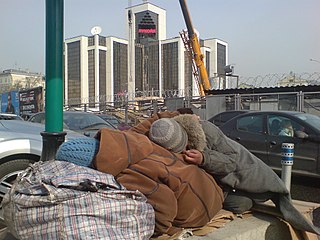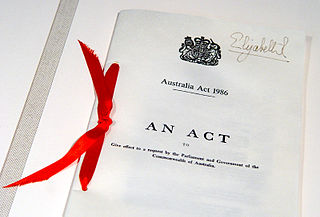Dock warrant, in law, a document by which the owner of a marine or river dock certifies that the holder is entitled to goods imported and warehoused in the docks.

Law is a system of rules that are created and enforced through social or governmental institutions to regulate behavior. It has been defined both as "the Science of Justice" and "the Art of Justice". Law is a system that regulates and ensures that individuals or a community adhere to the will of the state. State-enforced laws can be made by a collective legislature or by a single legislator, resulting in statutes, by the executive through decrees and regulations, or established by judges through precedent, normally in common law jurisdictions. Private individuals can create legally binding contracts, including arbitration agreements that may elect to accept alternative arbitration to the normal court process. The formation of laws themselves may be influenced by a constitution, written or tacit, and the rights encoded therein. The law shapes politics, economics, history and society in various ways and serves as a mediator of relations between people.

A dock is the area of water between or next to one or a group of human-made structures that are involved in the handling of boats or ships or such structures themselves. The exact meaning varies among different variants of the English language.
In the Factors Act 1889 it is included in the phrase "document of title" and is defined as any document or writing, being evidence of the title of any person therein named ... to the property in any goods or merchandise lying in any warehouse or wharf and signed or certified by the person having the custody of the goods. It passes by indorsement and delivery and transfers the absolute right to the goods described in it. [1]
In property law, a title is a bundle of rights in a piece of property in which a party may own either a legal interest or equitable interest. The rights in the bundle may be separated and held by different parties. It may also refer to a formal document, such as a deed, that serves as evidence of ownership. Conveyance of the document may be required in order to transfer ownership in the property to another person. Title is distinct from possession, a right that often accompanies ownership but is not necessarily sufficient to prove it. In many cases, possession and title may each be transferred independently of the other. For real property, land registration and recording provide public notice of ownership information.
The law of evidence, also known as the rules of evidence, encompasses the rules and legal principles that govern the proof of facts in a legal proceeding. These rules determine what evidence must or must not be considered by the trier of fact in reaching its decision. The trier of fact is a judge in bench trials, or the jury in any cases involving a jury. The law of evidence is also concerned with the quantum (amount), quality, and type of proof needed to prevail in litigation. The rules vary depending upon whether the venue is a criminal court, civil court, or family court, and they vary by jurisdiction.

A warehouse is a building for storing goods. Warehouses are used by manufacturers, importers, exporters, wholesalers, transport businesses, customs, etc. They are usually large plain buildings in industrial parks on the outskirts of cities, towns or villages.
In England in 1911, a dock warrant was liable to a stamp duty of threepence, which was denoted by an adhesive stamp, to be cancelled by the person by whom the instrument is executed or issued. [1]

England is a country that is part of the United Kingdom. It shares land borders with Wales to the west and Scotland to the north-northwest. The Irish Sea lies west of England and the Celtic Sea lies to the southwest. England is separated from continental Europe by the North Sea to the east and the English Channel to the south. The country covers five-eighths of the island of Great Britain, which lies in the North Atlantic, and includes over 100 smaller islands, such as the Isles of Scilly and the Isle of Wight.
Stamp duty is a tax that is levied on documents. Historically, this included the majority of legal documents such as cheques, receipts, military commissions, marriage licences and land transactions. A physical stamp had to be attached to or impressed upon the document to denote that stamp duty had been paid before the document was legally effective. More modern versions of the tax no longer require an actual stamp.




